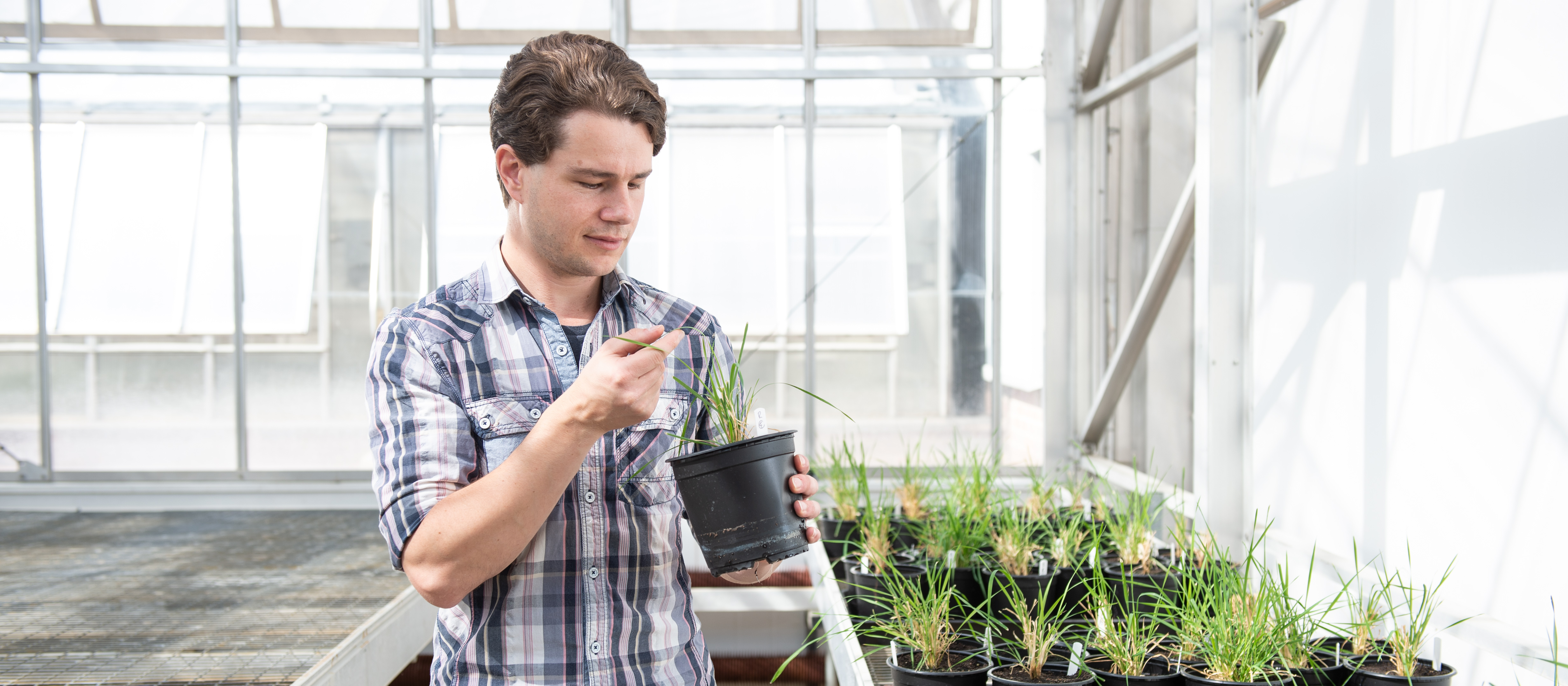The big picture: using wildflower strips for pest control
Scientists studying blackgrass, the UK’s most harmful weed, have detected early signs of resistance evolving to one of its main control agents, the weed killer glyphosate.
Worryingly, these latest findings show that this ubiquitous farmland weed could soon become uncontrollable, as glyphosate is one of the last lines of defence against what has been described as a weed “epidemic”.
If no new measures to combat blackgrass emerge, then falling yields of crops such as wheat would likely lead to higher prices in the shops.
Resistance to pesticides – like the antibiotic resistance crisis in healthcare - is a major problem for farmers across the world, and once resistance has evolved in a pest population, is almost impossible to reverse.
The results come from a new ‘early warning system’ that has been developed at Rothamsted that aims to identify those weed populations that are close to becoming herbicide resistant.
The scientists behind it say resistance to glyphosate would have considerable impacts on farmers, consumers and the environment, but if spotted early, resistance could still be avoided with smarter use of herbicides and other control methods.
Dr David Comont, the weed ecologist who led the study, said: “Several UK blackgrass populations are at risk of developing resistance to glyphosate, the world’s most used herbicide, and currently the last line of defence against the ongoing blackgrass epidemic.
“If glyphosate resistance did evolve, the impact could be extensive, with reduced wheat yields, and higher commodity prices.
“We need to develop ways to identify the early signs of resistance emerging. That way we can intervene before resistance becomes a major problem on farms.”
A previous study estimated that loss of control by glyphosate could result in 10-12% reduction in UK cereal and oilseed production, potentially costing over £500 million per year.
Glyphosate is one of the few herbicides that blackgrass isn’t already resistant to, and according to another recent study, it’s use by UK farmers has risen eight-fold in the last 30 years. It now accounts for a quarter of all herbicide sales globally.
According to Dr Comont, it is this increase in use that is driving the evolution of resistance.
“We found no evidence for high levels of resistance to glyphosate yet,” he said, “though we did find that sensitivity to glyphosate was reduced in several populations. Crucially, it’s the populations from fields where glyphosate has been used more extensively which are now less sensitive to this chemical. If glyphosate use continues escalating, it may only be a matter of time before resistance evolves.”

The results, published in the journal New Phytologist, demonstrate a completely new approach that combines field monitoring, glasshouse experiments, and classical genetics to predict the risk of resistance before it occurs in the field.
Working with collaborators at the University of Sheffield, the Rothamsted team collected blackgrass seed from 132 farmer’s fields across 11 English counties – from Hertfordshire in the south to Yorkshire in the north - in addition to collecting information on the how the field was farmed over the previous seven years or so.
More than 16,000 seedlings were grown from these seeds in glasshouses, and the effectiveness of glyphosate in controlling plants from each local population assessed.
Plants from nine of these populations were then cross bred to produce 400 new seed lines with known genetic pedigrees, that were also tested for their responses to glyphosate.
Crucially, the team showed that the degree of sensitivity was something plants inherited from their parents, and that the variation in sensitivity between populations was a result of historical glyphosate exposure – both prerequisites for pesticide resistance evolution.
Breeding from plants that survived glyphosate application resulted in offspring with even less herbicide sensitivity than their parents – clearly demonstrating that every generation is heading closer towards resistance than the last.
Taken together these results confirm that blackgrass populations can evolve reduced sensitivity to glyphosate on repeated exposure in farmers’ fields.
Co-author Dr Paul Neve, head of the Weed Ecology and Evolution research group at Rothamsted said: “Our work provides an early-warning to the UK farming industry that over-reliance on glyphosate is likely to lead to resistance.
“Glyphosate should be used judiciously in strategies that combine herbicide use with other cultivation or tillage practices to minimise herbicide survivors and reduce selection for resistance.”
Later this year Rothamsted will play host to the conference Resistance 19, the 8th International Meeting on Pesticide Resistance which will cover the latest research into resistance to insecticides, fungicides and herbicides.
The programme will include talks, posters and presentations under three headings “Molecular Mechanisms and Genomics”, “Evolution and Selection” and “Monitoring, Field Studies and IPM”, and it will bring together a wide range of academics, students, industry and stakeholder representatives to engage with the insights and strategies arising from the most up-to-date research.

Ecologist
Rothamsted Research is the longest-running agricultural research institute in the world. We work from gene to field with a proud history of ground-breaking
discoveries in areas as diverse as crop management, statistical interpretation and soil health. Our founders, in 1843, were the pioneers of modern
agriculture, and we are known for our imaginative science and our collaborative approach to developing innovative farm practice.
Through independent research, we make significant contributions to improving agri-food systems in the UK and internationally, with
economic impact estimated to exceed £3 bn in annual contribution to the UK economy. Our strength lies in our systems approach, which combines strategic research,
interdisciplinary teams and multiple partnerships.
Rothamsted is home to three unique National Bioscience Research Infrastructures which are open to researchers from all over the world:
The Long-Term Experiments,
Rothamsted Insect Survey and the
North Wyke Farm Platform.
We are strategically funded by the Biotechnology and Biological Sciences Research Council (BBSRC), with additional support from other national and
international funding streams, and from industry. We are also supported by the Lawes Agricultural Trust (LAT).
The Biotechnology and Biological Sciences Research Council is part of UK Research and Innovation, a non-departmental public body funded by a grant-in-aid
from the UK government.
BBSRC invests to push back the frontiers of biology and deliver a healthy, prosperous and sustainable future. Through our investments, we build and support a vibrant,
dynamic and inclusive community which delivers ground-breaking discoveries and develops bio-based solutions that contribute to tackling global challenges,
such as sustainable food production, climate change, and healthy ageing.
As part of UK Research and Innovation (UKRI), we not only play a pivotal role in fostering connections that enable the UK’s world-class research and innovation system
to flourish – we also have a responsibility to enable the creation of a research culture that is diverse, resilient, and engaged.
BBSRC proudly forges interdisciplinary collaborations where excellent bioscience has a fundamental role. We pioneer approaches that enhance the equality, diversity,
and inclusion of talent by investing in people, infrastructure, technologies, and partnerships on a global scale.
The Lawes Agricultural Trust, established in 1889 by Sir John Bennet Lawes, supports Rothamsted Research’s national and international agricultural science through the provision of land, facilities and funding. LAT, a charitable trust, owns the estates at Harpenden and Broom's Barn, including many of the buildings used by Rothamsted Research. LAT provides an annual research grant to the Director, accommodation for nearly 200 people, and support for fellowships for young scientists from developing countries. LAT also makes capital grants to help modernise facilities at Rothamsted, or invests in new buildings.